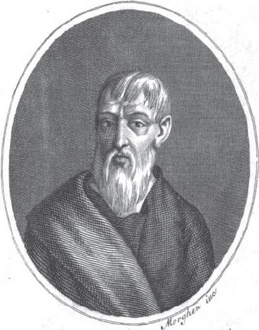هيروديكوس
المظهر
| هيروديكوس | |
|---|---|
 |
|
| معلومات شخصية | |
| الميلاد | القرن 5 ق.م |
| تاريخ الوفاة | القرن 5 ق.م |
| الحياة العملية | |
| التلامذة المشهورون | أبقراط |
| المهنة | خبير تغذية، وطبيب |
| تعديل مصدري - تعديل | |

هيروديكوس كان طبيباً يونانياً[1][2][3][4][5][6] منذ القرن الخامس عشر قبل الميلاد، ونشأ في سيليمبريا. وهو أول من استخدم العلاج بالتمارين ونسبه إلى نفسه، لمعالجة المرض والحفاظ على الصحة، ويعتقد أنه كان واحد من المتعلمين من أبقراط. وأيضا أوصى هيروديكوس بالحمية والتدليك الجيد باستخدام الزيوت والأعشاب المفيدة، وأعتبرت نظرياته الأساس في طب الرياضة. كان هيروديكوس محدد في نمط التدليك الذي يجب أن يعطى. وأوصى أن تكون البداية فرك بطيء ولطيف ثم بعد ذلك سريع مع تطبيق أكثر للضغط، الذي كان يتبعه حك لطيف.[7]
وأيضا وصف هيروديكوس بأنه سيد الجمباز وسفسطائي. طبقا لأفلاطون، وأوصى هيروديكوس أن مشي مرضاه من أثينا إلى ميغارا مسافة أكثر من 20 ميلا بقليل.
المراجع
[عدل]- ^ Janet Buckworth؛ Rod K. Dishman؛ Patrick J. O'Connor؛ Phillip D. Tomporowski (2013). Exercise Psychology. Human Kinetics. ص. 3. ISBN:978-1-4504-0709-0. مؤرشف من الأصل في 2020-02-28.
- ^ William D. McArdle؛ Frank I. Katch؛ Victor L. Katch (2006). Essentials of Exercise Physiology. Lippincott Williams & Wilkins. ص. 7. ISBN:978-0-7817-4991-6. مؤرشف من الأصل في 2017-01-06.
- ^ Jack W. Berryman (1 يناير 1992). Sport and Exercise Science: Essays in the History of Sports Medicine. University of Illinois Press. ص. 12. ISBN:978-0-252-06242-1. مؤرشف من الأصل في 2019-12-17.
- ^ Areej Hassan (6 مارس 2015). School Nutrition and Activity: Impacts on Well-Being. Apple Academic Press. ص. 23. ISBN:978-1-4987-2173-8. مؤرشف من الأصل في 2020-02-28.
- ^ Lawrence Barnet Phillips (1871). The Dictionary of Biographical Reference Containing One Hundred Thousand Names Together with a Classed Index of the Biographical Literature of Europe and America by Lawrence B. Phillips. Sampson Low, Son & Marston. ص. 494. مؤرشف من الأصل في 2020-02-10.
- ^ Physical Activity and Health: A Report of the Surgeon General. Government Printing Office. 1996. ص. 13. GGKEY:4N1Z4L1RBBR. مؤرشف من الأصل في 2019-12-17.
- ^ Early American Manual Therapy (Version 5.0) - Chapter 1 History and Development of Mechanical Vibration Therapy نسخة محفوظة 2005-03-09 على موقع واي باك مشين., Accessed: October 6, 2008. "IN THE 5TH CENTURY HERODICUS advocated exercise for the treatment of disease and compelled his patients to have their bodies rubbed, he being a firm believer in the efficacy of massage. JOSEPH SCHREIBER, M. D., author of "Treatment of Massage and Exercise," translated by Walter Mendelson, M. D., of New York, claims that Herodicus first laid down principles for rational, mechanical methods of treatment. HERODICUS, 484 B. C., was one of the first to refer to the manner of giving massage. He said friction should be gentle and slow at first, then rapid in combination with pressure, which was to be followed by gentle friction. Other advocates were Plato, Socrates, and Hippocrates, who said "rubbing can bind a joint that is too loose, and loosen a joint that is too rigid. Hard rubbing binds, soft rubbing loosens, much rubbing causes parts to waste, moderate rubbing makes them grow." This is the earliest definite information relative to the effect of variations in the application of massage. These maxims should be remembered by those who use mechanical vibration for they well define its general therapeutic application. Hipppocrates also suggested the direction in which to apply massage the art of rubbing up, thereby assisting mechanical and physical processes, aiding circulation, relieving stasis and consequently quickening metabolic processes."
